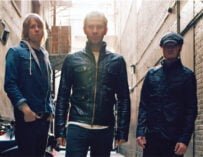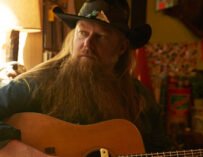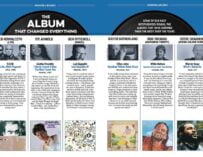Jack of all trades: not content with just saving the world, the ’24’ star is now making great music
Most people will know Kiefer Sutherland as the actor who, for the last four decades, has dominated screens both large and small. In films such as The Lost Boys, Young Guns and Flatliners, and more recently as Jack Bauer, the action hero of smash television show 24, his characters have loomed large over our cultural landscape. Such is the strength of his acting work that many eyebrows were raised when Sutherland announced details of his first solo album, Down In A Hole, back in 2016, especially when it was revealed that he had also written (or co-written) each of the 11 tracks. How dare someone as successful as Sutherland try his hand at making music!
But you know what, he’s really rather good at it and he now returns with his second album, Reckless & Me. The record once again finds him working with the singer-songwriter/producer Jude Cole, and is another collection of honest and relatable country songs. It’s also a confident step forward for Sutherland, as if the positive reaction to the first album and the hundreds of shows he’s played during the intervening years, have emboldened him to carry on his musical journey – best highlighted by the new album’s final track, Song For A Daughter. We recently caught up with Kiefer to chat about his writing and the key differences between making music and acting…
When the first album came out, you mentioned the stigma attached to an actor releasing music. How does it feel this time, now that you’ve established yourself?
“I think I’ll probably be aware of that stigma, or the eye roll, for the rest of my life. I’ve worked as a professional actor for almost 40 years and that’s what people know me for. People are just innately suspect of anyone who changes direction mid-life. But the truth is, I do both. I have no intention of not working as an actor, that’s one of the great loves of my life. I’ve loved music my whole life too, I’ve had a small label and have been involved in other people’s careers extensively over the last 25 years. It just took me to get to a certain part in my life where I felt like I really had something to write about, or a way to write something that mattered to me.
“Having said that, when I did Down In A Hole, I had no intention of making an album. We were recording two or three songs at a time, as demos to send to BMI or Sony to see if they had artists that would be interested in doing them. That was really important for me as I got to record the songs in a very free way. Then the producer of those demos, Jude Cole, encouraged me to think about doing an album because he really liked the way they sounded. I have to be honest, around the fifth or sixth track I felt the same. I really did love the way he was making these songs sound, they were very clearly from my voice. They had my vernacular, they were saying what I wanted to say, and so ultimately we went forward and did that.”
How different was it to write songs with an album in mind?
“We’ve all heard the stories, you’ve got a lifetime to write your first one and then six months to write the second one. I had an incredible luxury because I already had a lot of material and we’d played 300 shows by then and so the second record was really about figuring out the songs I wish I had for my set. I wish I’d had a real honky-tonk song and This Is How It’s Done came out of that. You start writing and playing little riffs, either with the band or on your own, thinking, ‘God, wouldn’t it be cool to have a rocking song right here,’ or, ‘This is the kind of ballad I’d like to have.’
“So it happened quite quickly because I knew what I was writing for – for what would help us make a better show. I’ve always been an objective-orientated person, which I regret at times. When I was doing a show like 24, it was always about finishing so maybe I didn’t enjoy the moment because I was getting the day done. I had to have something to write to, ‘What kind of songs do you need so that the whole set is yours and that it will really have a flow and rock its way to the end?’ I wrote to that and that was really helpful.”
Were the songs written while you were on the road?
“A few of them, yeah. This Is How It’s Done was written in a bar in Louisville, Kentucky, waiting for half my band. Their flight had been cancelled and we had a show in a few hours and I was trying to do anything to pass the time. I was quite nervous that they weren’t going to show up and that I would have had to do a festival show by myself. So I literally walked into a bar to grab something to eat and wait it out, and the bar reminded me of the first bar I ever walked into. It was one of those rare songs that wrote itself very quickly. From the time I sat down to ask the waiter to come back twice, I had the lyric done. It was slower when I wrote it than it ended up on the record. Jude Cole and Brian MacLeod on drums set the tempo to it. It was almost twice as fast and I love the song like that.”
Would you also have to take yourself away from your acting work to make time for songwriting?
“I wrote a lot of the songs on the first record, and a couple on this record, when I was doing 24. For an actor there is downtime. Not as much in television as there is in film, but it does take time to lay the dolly track down and set up the lights. You do one shot and then they have to turn around and shoot the other version and that takes time. Time has never been an issue. It’s being able to take yourself out of the moment of what you’re doing and allow something else to permeate your brain. I had a lot of ideas when I was younger that were a verse and chorus, but that was it, and I never followed through with them and then those things just never get completed.
“One thing that I found out is that it’s really important for me to finish the whole song. Let’s say I have a first verse that I really like and I’ve got a melody for a chorus but I don’t have the lyric, I’ll still write something down. It could be gibberish but I have to have the whole construct of the song completed. I’m not one of those people who has a drawer full of half ideas or half-finished songs. I will do whatever I can to finish it and then I have no problem reworking it. For the first record, we recorded 15 songs and 11 made the album; there are somewhere you go, ‘I did the best I could and I still don’t like this song.’”
At what point does Jude Cole come into the process?
“It depends. There were certain times during the first record where we would sit down and have proper writing sessions, spending a day with an idea that I had. Some songs, Jude’s more involved in than not. He and I have been best friends for 35 years and it’s just easier to do the songs as a partnership. Something like Saskatchewan I pretty much finished, but Jude is such an incredible songwriter and musician that he can change one line in a song and all of a sudden the tone shifts. Other songs, like Something You Love, that was his song and I helped him complete that. Open Road is one of Jude’s songs, period. Unlike the first record, I was not as concerned that every idea had to stem from me. Again, when you’re looking to make a great set, the only thing that matters is a song that will fit.”
Do you still enjoy writing in the first person?
“I think so. Shirley Jean was the only song on the first record which was a made-up story, a homage to Johnny Cash and Merle Haggard and guys who wrote about people in prison. Everything else allowed me to sing in a personal way that was really helpful for me. So yeah, it’s looking back on my life. Make no mistake about it, I consider myself to be one of the luckiest people I’ve ever known, but that doesn’t mean that you get away in life without experiencing some really difficult things – the loss of a loved one, the death of your mum, a broken heart. I don’t care how fortunate you might be, you’re not going to escape those things. Those tend to be the things that you talk about when you get together with friends. Those are the things that we need help from each other to get through. I have found that sharing those stories in a show can be moving for myself and an audience. That experience has pushed me in that direction and I feel confident there.”
We thought you might be a bit more guarded in your writing as a result of having had experience with the tabloids?
“Well, I wish I would have thought that through. I really hadn’t thought about that part of it until I went on stage for the first time. I would say for the first ten shows I ever played I was pretty guarded and didn’t talk a lot. Then, for some reason, we did a show in Ann Arbor, Michigan, about five years ago and the audience was seated. I just felt confident to say, ‘This is what I was going through at this time and this is why I wrote this song and if you’ve gone through something similar this song is for you,’ and told a little story. The response was so generous that I realised, at least at 500-people at a time, I had no problem having this conversation about my life. It was one of the most liberating experiences I’ve ever had, so I trusted that and followed it. I think at the age of 25 I probably would not have been as comfortable with that as I am now. You take ownership for the mistakes that you’ve made and if you can’t laugh about some of them at this point in your life then you’re in real trouble.
That must have been very liberating…
“Absolutely. In fact, for the first 10 shows of our next tour, we’re going to Germany, the Netherlands and England for small intimate sets. It’s going to be broken down and there will be moments where there will be mics in the audience and I’ll let someone ask me why I wrote a song. I really want to try and do everything I can to engage in this idea of the show being a show but a conversation about what we’re all going through in life.”





































Related Articles